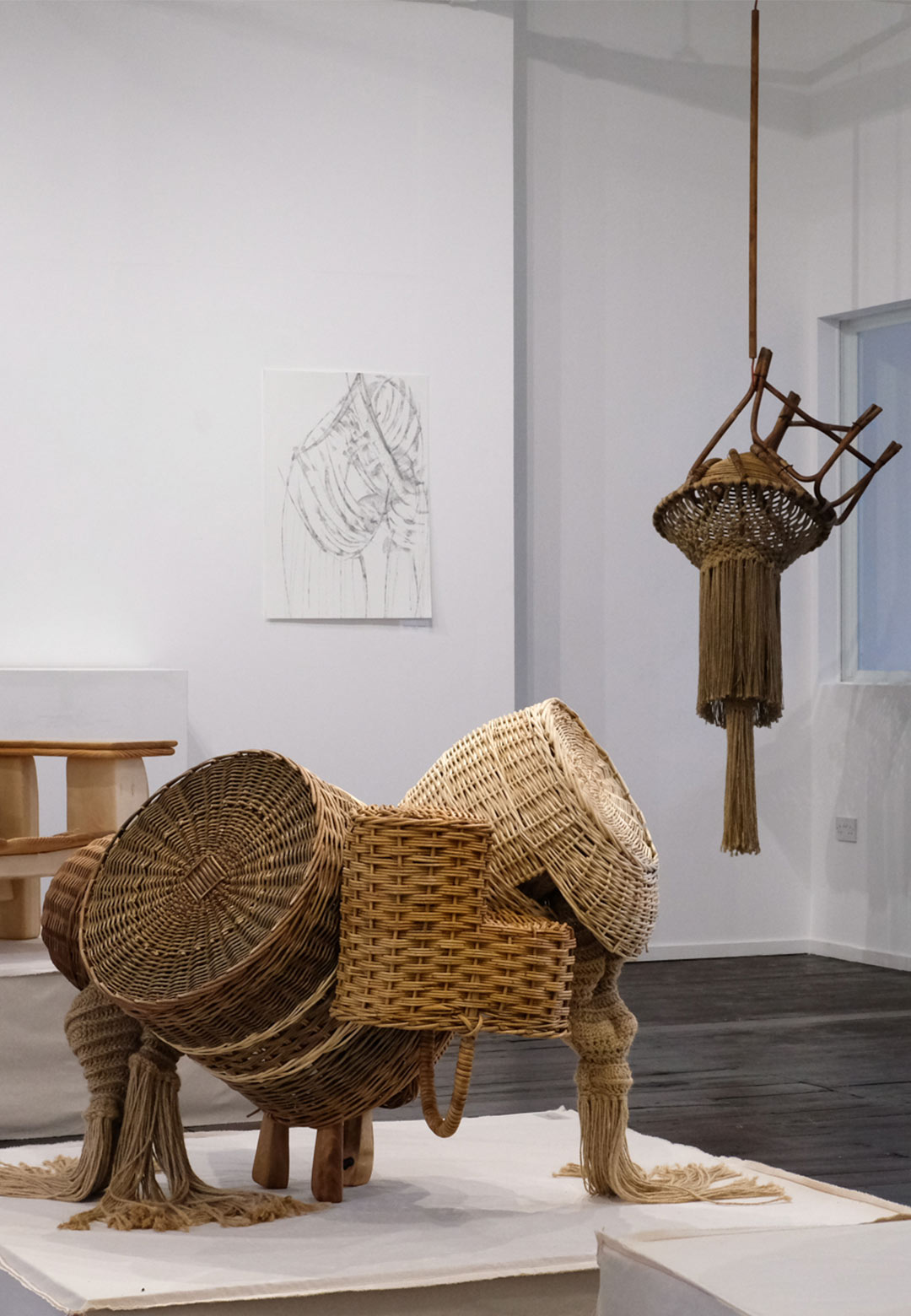Overgrowth often evokes images of untamed gardens, wild vines spilling over fences, or a once-manicured lawn transformed into a riot of green. But what if this state of imbalance, this seeming excess, isn't disorder at all? What if overgrowth holds its kind of harmony, one that exists outside human expectations? This tension between what we see as chaos and what nature presents as equilibrium forms the core concept of the overGrown show, the first collaboration between British artist Christopher Kelly and furniture designer Daniel Hayden, which is on view from October 8 - 26, 2024, at the Ensō House in London.
At its heart, the design exhibition embraces the unexpected. It is a collection that invites viewers to ponder how objects function and exist, particularly in the overlap between art and craft. Drawing from Kelly's ongoing exploration of neurodivergence, the pieces question where imbalance, growth and tension coexist in everyday life. With works that merge crocheted textiles and wooden furniture, Kelly and Hayden disrupt each other's practices in playful, thoughtful ways, creating new sculptural art pieces that soften the boundaries between the functional and the abstract.
The product design collection includes five types of seating objects: Stability Chair, Holding Chair, overGrown Chair, Aerated Stool and Unstaked Column. While each retains hints of furniture design, they challenge assumptions about use and comfort. The Bristol-based designer's use of traditional craftsmanship, rooted in functional pieces, is stretched to the point where it becomes unclear if the pieces are meant to be used at all or simply admired as statements. The interplay of furniture and organic textile interventions leaves the pieces suspended between utility and art. The collection plays with 'minimal excess', a concept where natural growth appears overblown, yet each element serves a purpose; much like weeds overtaking a neglected garden or roots breaking through pavements.
Kelly's contribution to the designs reflects his broader artistic practice, which focuses on themes of neurodivergence and the creative mind through a project called Interwoven: Dis/Functional. His work incorporates sustainable jute twine and techniques such as crochet, macramé and weaving. He often reclaims discarded furniture, transforming it with textiles to explore the tension between dysfunction and accessibility. With overGrown, his interventions envelop the British designer's wooden pieces, sometimes overwhelming them, creating a layered effect that invites audiences to reflect on the experience of neurodivergence: what looks chaotic on the surface might hold its own form of balance underneath.
For Hayden, the show at Ensō London represents a shift in his practice. Known for merging traditional techniques with playful contemporary designs, his work explores emotional connections and possibilities with objects, often balancing beauty with function. In overGrown, however, the function is deliberately set aside. The furniture becomes an exploration of imbalance and tension, both in how the pieces are made and in their relationship to the artist's textile forms. The collaboration pushes the product designer beyond his usual focus on utility, turning his chair designs, stool designs and columns into almost unrecognisable hybrids of sculpture and furniture.
One of the standout elements of the collection is how the two artists augment each other's work. Hayden's clean lines and signature shapes are altered and sometimes obscured by Kelly's intricate, crocheted patterns. In the overGrown Chair, the yarn seems to swallow the wooden frame, transforming it into a sprawling, organic form. The Holding Chair offers a similar sense of tension, where the textile component looks as though it might constrain or support the wooden structure, creating a visual dialogue about dependence and balance. These pieces aren't just furniture—they are metaphors for the way people manage discomfort, tension and complexity.
Kelly and Hayden first connected during the Future Icons Selects show at London Craft Week 2024. Sharing a love for minimally processed, natural materials and an appreciation for what they describe as "perfect imbalance", they quickly found common ground. Their shared philosophy embraces the idea that tension and disproportion can be just as meaningful as harmony and balance. This idea resonates deeply throughout overGrown, where moments of seeming disorder like a wild garden reveal subtle layers of intent and sustainable design.
overGrown invites us to reconsider the everyday objects surrounding us. Chairs are, by definition, practical objects. We expect them to offer stability and comfort. But in the exhibition, they are stripped of predictability, encouraging viewers to question the assigned roles that these 'things' play in our lives. Are they mere tools for sitting, sculptures to be admired, or symbols of deeper ideas about growth and balance?
In a world that often prioritises efficiency and control, overGrown makes a case for embracing the unexpected. Just as a garden left to grow wild finds its beauty, these works show that objects, too, can thrive in states of imbalance and imperfection. By merging art and function in unconventional ways, Kelly and Hayden open up new possibilities for their individual practices, and how we think about spaces and the objects of functional art that take residence within.
'overGrown' is on view from October 8 - 26, 2024, at the Ensō House in London, the UK.






 Sign in with email
Sign in with email










What do you think?